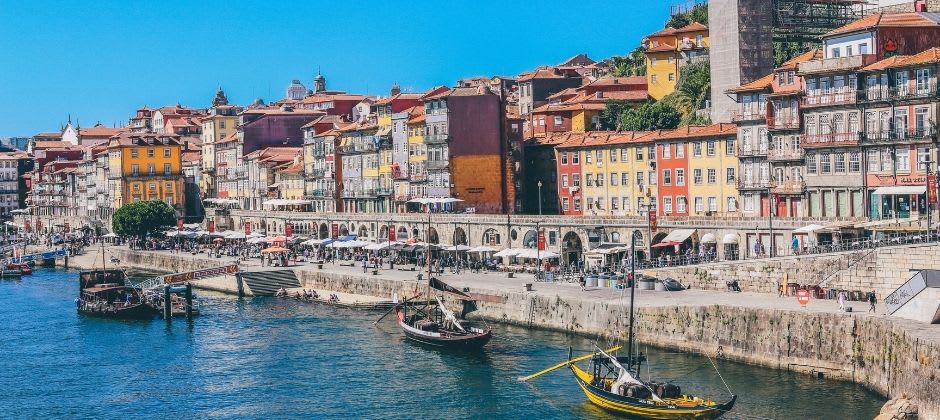Study in Portugal: Student Visas & Permits
The student visa requirements for studying Portugal depend on your nationality. The rules differ for EU/EEA nationals and non-EU/EEA nationals. Read on below to figure out what visa requirements you should consider before you travel to Portugal! Students from the EU and the EEA do not need a student visa to study in Portugal.

The student visa requirements for studying Portugal depend on your nationality. The rules differ for EU/EEA nationals and non-EU/EEA nationals. Read on below to figure out what visa requirements you should consider before you travel to Portugal!
EU/EEA Nationals
Students from the EU and the EEA do not need a student visa to study in Portugal but if your stay in Portugal will exceed 90 days, you must apply for a certificate of registration (Certificado de Registo) upon arrival at the local city council office. You should bring a national identity card or passport, as well as a valid European Health Insurance Card in order to be officially added to the population register. EU/EEA students should report their arrival and receive their registration within their first four months in Portugal. Students who are EU/EEA nationals can work in Portugal without any restrictions.
Non-EU Nationals
Non-EU/EEA students wanting to study in Portugal will require a student visa and a residence permit for the duration of their studies. International students should visit the Portuguese embassy or diplomatic mission in their home country to make their visa application. Non-EU students must obtain their visas before travelling to Portugal. Your visa application can take anywhere between one to three months to process, so make sure to apply early! Once non-EU students arrive in Portugal, they should book an appointment with the local branch of the Portuguese Immigration and Borders service (SEF) to apply for their residence permit.
There are two types of visas applicable to non-EU international students planning to study in Portugal:
- Type C: This short-stay visa is for non-EU students or researchers planning to undertake a course or research project in Portugal with a duration of less than 90 days.
- Type D: This visa is for all non-EU students or researchers undertaking studies in Portugal lasting longer than 90 days.
If you apply for any type of visa, like EU/EEA students, you will also be required to apply for a residence permit once you arrive in Portugal. Non-EU students can take up casual employment in Portugal (up to 20 hours a week) and work full-time during holidays or non-study periods.
How to Apply for a Student Visa to Study in Portugal
You can start the visa application process once you have received a letter of acceptance from a higher education institute in Portugal. The process is conducted at the Portuguese embassy or consulate in your home country - you may need to schedule a visa interview on their website, where you can also check the required documentation as it can differ depending what country you’re from.
The documentation that you need for your visa application might entail the following:
- Your completed application form (downloaded from the website of your local Portuguese embassy or consulate);
- A passport photo in color;
- A valid passport that expires no sooner that three months after your planned departure from Portugal with at least one blank visa page;
- A letter of acceptance from a Portuguese higher education institution;
- Proof that you have the financial resources to support yourself during your stay;
- Proof of valid health insurance;
- A copy of your travel itinerary to Portugal;
- Proof of accommodation, either on campus or privately; and
- You will also need to pay a visa application fee of up to 170 EUR.
Always confirm with your local consulate or embassy about the required documentation before submitting your visa application!
Residence Permits
Once you arrive in Portugal with your valid visa, non-EU/EEA students will need to apply for a residence permit which will be valid for one year. After a year, residence permits can be renewed for up to five years at your local SEF office.
The documentation required to apply for a residence permit is as follows:
- A completed application form;
- A valid passport and photocopy;
- Two recent passport sized photos in color;
- Proof that you have the financial means to support yourself in Portugal;
- Proof that you have adequate accommodation in Portugal;
- Proof that you have medical insurance;
- Proof of registration at a Portuguese higher education institution; and
- Proof that you’ve paid any applicable tuition fees.
Learn more about study abroad in Portugal:
Overview of Portugal
Over 50,000 international students choose Portugal as their study abroad destination every year. Click here to learn why.
Education System
The higher education in Portugal follows the traditional three-cycle format, split into undergraduate (Bachelor’s), graduate (Master’s) and postgraduate (Doctorate) certifications. Take a minute to learn more.
Housing & Living Costs
Compared to many other European nations, students who choose Portugal as their study abroad destination can look forward to a more budget-friendly experience overall.
Tuition Fees & Scholarships
Higher education institutions in Portugal independently choose how much they want to charge both national and international students. Take a look at some of these costs here.
Language & Culture
With about 260 million speakers worldwide, Portuguese is the sixth most spoken language in the world. Find out more about what the country offers in terms of language, culture, and more!
Application Process
All countries have specific admissions requirements for students to gain acceptance into a university. Learn more about the ins and outs of admission to programs in Portugal, and what you need to apply.
Programs
Interested in studying in Portugal? Use our search engine to find and compare top programs in Portugal today!

Author
The Keystone Team is comprised of experienced educators and advisors dedicated to providing valuable resources and advice to students all over the world.